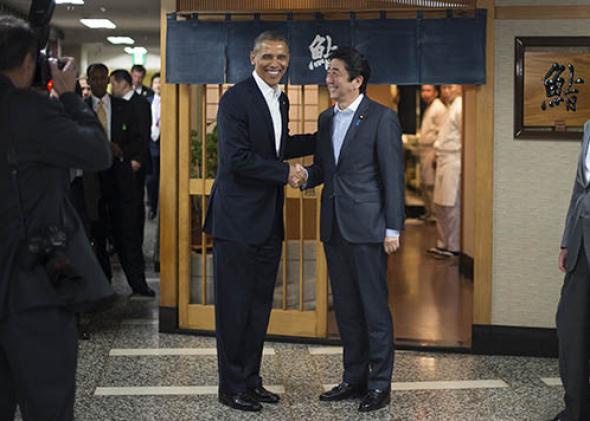As the great philosopher John Lennon once wrote (in his case, all too presciently), “Life is what happens to you while you’re busy making other plans.” Barack Obama has long been making plans to “pivot” American foreign policy away from the stagnant or dormant battles of the Middle East and Europe, toward the vibrant opportunities in Asia-Pacific—but the cluster of Old World struggles (or, as Lennon put it, “life”) keeps pulling him back in.
Obama’s desire for a pivot (or “rebalance,” as the White House renamed it after panicked complaints from Middle Eastern and European allies) is no mere slogan. He is, after all, a product of the Pacific, only the second president (after Richard Nixon) to be born in California or points west; in his case, of course, Hawaii, with much of his childhood spent in Indonesia—that is, in Asia. Whatever the cause of his interest, former aides say that, as far back as the transition between the 2008 election and his inauguration as president, Obama talked up the importance of Asia. It is significant, they add, that Secretary of State Hillary Clinton’s first overseas trip was a four-country jaunt to Asia (Japan, South Korea, China, and Indonesia) and that Obama’s first state dinner at the White House hosted the prime minister of India. He meant the trip and the dinner to signal a shift in America’s priorities.
And so, this week, Obama finally embarked on his own four-country trip to Asia, focused on the main U.S. allies in the region—Japan, South Korea, Malaysia, and the Philippines. He last planned a trip in October 2013, but he had to cancel it in order to deal with the Republican-led government shutdown. That had promised to be an important trip. The occasion was the Asia-Pacific Economic Cooperation summit. Obama sent Secretary of State John Kerry to take his place, but the Japanese in particular—who tend to view international politics in unusually personal terms—took Obama’s absence as a snub, and China’s president, Xi Jinping, dominated the event.
This week’s trip was planned as a makeup session of sorts. Obama’s main goals were, first, to allay the allies’ concerns about America’s commitment to their security in the face of an expansive Chinese navy and, second, to complete a trade treaty, the Trans-Pacific Partnership, which has been central to Obama’s vision of a rebalanced foreign policy.
But, once again, life has gotten in the way. The spotlight has turned, improbably, to Ukraine. Not only has Russian President Vladimir Putin’s land grab riveted everyone’s attention, it also threatens to upend the whole concept of the pivot, at least for a while. The concept, as Obama initially laid it out, rested on three premises: a desire to get out of the Middle East’s quagmire-wars; a view of Asia-Pacific as the emerging center of dynamic growth; and an almost unspoken assumption (it seemed so obvious at the time) that Europe needed no special minding, that the era of crises on the continent had passed. The first premise is still laudable, the second still persuasive, but the third … well, clearly, the map of Europe is no longer so stable.
The West’s preoccupation with Ukraine, especially the question of how Obama will respond if Putin sends troops into Donetsk or deeper, is a complicated matter for the Asian allies, especially Japan—and in a way that makes it hard for Obama to come out well, no matter what he does.
Daniel Sneider, associate director of the Shorenstein Asia-Pacific Research Center at Stanford University, says that, even more than other allies, Asians “pay attention to whether we’re paying attention.” (This is why Obama’s no-show at the 2013 summit left such a wide opening for China.) Their response to our fixation on Ukraine, Sneider says, is “schizophrenic: On the one hand, they’re apprehensive that we’re paying attention to Europe, not to them. What if China does something while we’re going off to Ukraine? On the other hand, they’re very interested in the question of American strength and will—if we’re not going to be tough against the Russians in Ukraine, can they trust us to be tough against the Chinese in the Pacific?”
The Japanese are also upset that Kerry is spending so much time in the Middle East, which means so little time in Asia. Their complaint might have a point when it comes to Kerry’s overly keen efforts to spur Israeli-Palestinian peace talks, since they seem to be going nowhere; arguably, he might better use his time untangling the increasingly bitter quarrels over certain matters of World War II history between Japan and South Korea. But it’s parochial in the extreme for either country’s leaders to chide Kerry for his attention to the nuclear negotiations with Iran—a truly historic opportunity, and one ripe with possibilities.
Time—that’s the true culprit. Most presidents move into the White House unfurling blueprints for changing the world, and soon enough resign themselves to putting out small fires, which seem to be erupting all around them, one after another. Obama inherited a few forests of these fires: two wars, the worst financial crisis in decades, a political opposition determined to deny him the slightest success—all this amid the larger canvas of increasingly anarchic global politics, in which no one country or set of countries has the leverage to get its way as much as it once did.
Obama wants to pivot westward, but the world has other plans.
